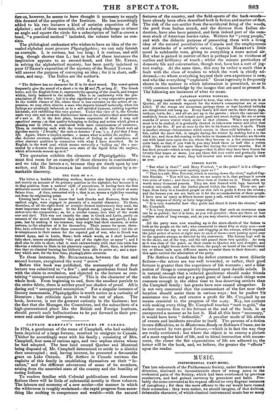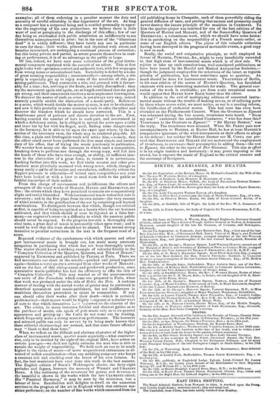MUSIC.
INSTRUMENTAL PART-MUSIC.
THE late rehearsals of the Philharmonic Society, under MENDELSSOHN'S direction, disclosed no inconsiderable share of wrong notes in the orchestral parts of the Society, which had been overlooked by previous conductors, and had gained currency by precedent and habit. Pro- bably the notes corrected at his request offered no very flagrant instances of cacophony ; for then the mere offence to the ear would have caused their correction : they were rather, we should imagine, of that dubious, debateable character, of which classical instrumental music has so many
examples ; all of them enforcing in a peculiar manner the duty and necessity of careful editorship in that department of the art. As long as a composer has a corporeal being and is enabled personally to super- vise the engraving of his own productions, we believe there is little want of zeal or perspicuity in the discharge of this office ; few of our day being so overloaded with public admiration as indifferently to see themselves misrepresented in print : but in the case of the "illustrious dead" it is widely different ; they have rarely any one in particular to care for them : their works, printed and reprinted with errors and beauties intermixed, are undergoing a continual process of correction ; but this being private and partial, as errors present themselves in read- ing or performance, it is of no advantage to the public at large.
Of late, indeed, we have seen some collections of the great instru- mental composers reprinted with the curavit of an editor. This at first sight looks well—promises correct and authentic text, with few stoppages from wrong notes or miscalculated bars. Incredulity is defied by a name of great seeming responsibility ; amateurs collect—among others, a trio party is especially got up to enjoy some of the novelties of this pro- mising publication. They commence a trio, and proceed with it favour- ably for a time ; but, arriving at the finale, are totally discomfited : they try the movement again and again, are at length convinced that the parts are wrong, and their amusement receives a most unpleasant interruption. To discover the source of such an error, is not always very easy, indeed scarcely possible amidst the distraction of a music-party. Reference to a score, which would decide the matter at once, is not to be obtained ; and now it falls probably to some musician's task to edite the editor and discover the blunders which he should have corrected. This is a troublesome proof of patience and sincere devotion to the art. First, having counted the number of bars in each part, and ascertained in which a deficiency exists, he is obliged to spread the parts upon a table and trace bar by bar with his finger, until, finding some disagreement in the harmony, he is able to hit upon the exact spot where, by the in- sertion of the necessary rests, the whole may be rendered playable. All this time, a plain and irrefragable truth will strike him,—namely, that the editor could never have performed the first most simple and natural duty of his office, that of trying the music previously to publication. We wonder how many are the instances in which such a composition, breaking down in performance through the wrong copy, will fall into the hands of those who have time enough, or ability, or sufficient inte- rest in the abstraction of a great fame, to restore it to correctness. Looking farther into this work, we find violin sonatas and other pro- ductions most plentifully seasoned with wrong notes. which, though to many easily capable of detection and emendation, sufficiently evince the flippant pretence to editorship—if indeed such compositions can ever have been looked at with a view to send them forth to the public as faithful transcripts of their author.
From this charge of carelessness and indifference the editors and arrangers of the vocal works of MOZART, HAYDN, and BEETHOVEN, are free : the errors which they have permitted to remain are comparatively slight and venial blemishes. With instrumental music redoubled care is necessary ; and in the first place from its own nature—the very essence of which consists in the gratification of the ear by surprising and learned combinations. To distinguish between that which, though not relished at first, is capable of being recognized as a beauty when the ear becomes cultivated, and that which should at once be rejected as a false har- mony—an engraver's error—is a difficulty to which the amateur public should never be exposed. In the progress towards a thoroughly clas- sical taste, a great deal of music is necessarily taken upon trust ; and it would be well that this trust should not be abused. The second strong incentive to peculiar correctness in the text is the frequent need of a score.
Repeated evidence of the carelessness with which quartet and other part instrumental music is brought out, has made many amateurs scrupulous in purchasing that which has not been thoroughly tested. The reader should know a striking example of editorial fidelity in the " Complete Collection of the Quartets, Quintets, and Trios of Mozart," engraved by RICHOMME and published by PLEYEL at Paris. There we find movements cut short in the middle—patched and joined together again—besides several quartets arranged from other works of MOZART; and on the face of this disingenuous and patchwork production, some speculative music-publisher has had the effrontery to affix the title of " Complete Collection." This may remind us of the unceremonious sew score of Der Freischutz which some one prepared in Paris, when that work was produced under the title of Robin des Bois. A reckless manner of dealing with the sacred works of genius may be pardoned in theatrical speculators and music-publishers, but not indifference in musicians themselves pretenders to talent in composition. If any one should edite their works after their death—which is certainly problematical—their manes would be highly ladignant at a similar want of care to that which themselves La72 t.estowed on the classics of the art. The critics, in many instances faithful and discreet guides as to the purchase of music, can speak of part-music only as to its general appearance and getting-up : the faults do not come out by reading, which frequently make a strong muster on performance. The innocent and misused public can only be served by its being made known that these editorial shortcomings are noticed, and that some future offender may "blush to find them fame." When we reflect on the difficult and abstruse character of the higher class of instrumental music, quartet music especially—what controver- sies, only to be decided by the sight of the original MSS, have arisen on certain passages—we shall not lightly estimate the man who is able to Sustain the weight of responsibility. We hold such an one to be much higher in the ranks of music—of more unquestioned enthusiasm as di- vested of selfish consideration—than any middling composer who keeps a constant coil and clucking over the brood of his own failures. In fact, the best musicians have ever done this work in the best manner. The English edition of Baca's Wohltempirte clavier, the forty-eight preludes and fugues, honours the memory of WESLEY and CHARLES Ilonx. A like testimony of the reverence for genius and devotion to the beautiful is shown in the works which the late CLEMENTI edited. His '" Practical Harmony," it may be seen by the selections, was a labour of love. Recollection still delights to dwell on the numerous services to the progress of the art in England which that eminent mu- sician performed; on the number of fine works which emanated from the old publishing-house in Cheapside, each of them powerfully aiding the general diffusion of taste, and proving that success and prosperity could never destroy the innate principle of the musician in CLEMENTE To him the quartet-player was indebted for one of the best editions of the Quartets of HAYDN and MOZART, and of the Rasamoffsky Quartets of BEETHOVEN; a voluminous work, which we should have some hesita- tion in purchasing on the responsibility of a French music-seller, or some of our English editors. The plates of this valuable collection having been destroyed in the progress of mercantile events, a good copy is now to seek.
Really, the social and cooperative principle, so well employed in favour of HANDEL, PURCELL, &c., might be very beneficially extended to that high class of instrumental music which is of slow sale. We rejoice to take up such conscientious, well-considered publications, as have been issued by the Handel and Musical Antiquarian Societies,— though the judgment employed in the selections of the latter, as regards priority of publication, has been sometimes open to question. As much should be done for instrumental music. TRAUTWEIN of Berlin, in his neat edition of the scores of HAYDN'S Quartets, has furnished amateurs with some interesting materials for study. The general exe- cution of the work is creditable ; yet from some occasional notes it would appear that HAYDN knew BACH better than his editor.
In addition to the evil of multiplying editions of concerted instru- mental music without the trouble of making scores, or of collating parts by them where scores exist, we must notice, as not le•s needing reform, the falsification of orchestral scores. This bad taste has even been obtruded on the Philharmonic Concert. When the Overture to Egmont was rehearsed during the late season, trombones were heard. " Bless my soul !" exclaimed the astonished Conductor, " who has done this? Trombones in the Overture to Egmont!" "Sir HENRY BISHOP," was the reply. The trombones were silenced. When Mr. PERRY puts new accompaniments to HANDEL at Exeter Hall, he has at least HANDEL'S comparative ignorance of the wind-instruments or their effects to allege in his defence; but neither Sir HENRY BISHOP nor M. COSTA can pre- tend that BEETHOVEN and MOZART did not understand the employment of trombones, to extenuate their presumption in adding them—the one to Egmont, the other to the opera of Don Giovanni. This aim at effect is in its origin tasteless and mercenary : it may prove imposing to the crowd, but it exposes the music of England to the critical censure and the contempt of foreigners.



























 Previous page
Previous page